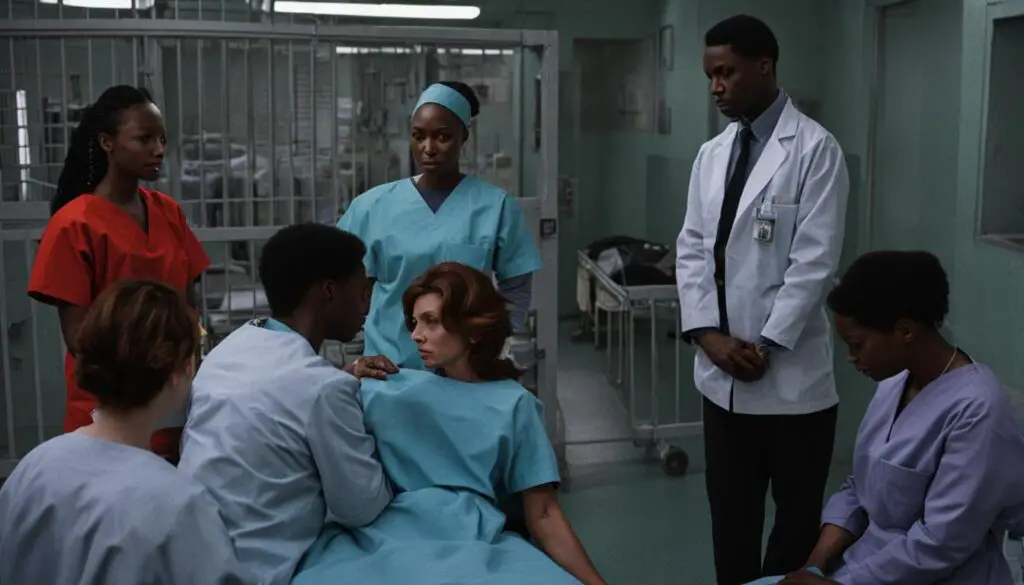
If you’re looking for a nursing career that challenges you both professionally and personally, correctional nursing may be the perfect fit for you. Working as a correctional nurse means providing healthcare to incarcerated individuals, making this profession a unique and fulfilling experience.
While the thought of working in a correctional facility may seem daunting, it can be an incredibly rewarding opportunity to make a meaningful impact on an underserved population.
Correctional nurses must be compassionate, detail-oriented, and able to adapt to a constantly changing environment. They work alongside correctional officers to ensure the safety and well-being of inmates, providing medical care that ranges from regular check-ups to emergency treatment.
If you’re interested in learning more about correctional nursing, its challenges, rewards, and the opportunities it presents, read on to discover everything you need to know about this fulfilling career path.
Healthcare in Prisons: Providing Medical Services in Correctional Facilities
Healthcare in prisons is a critical aspect of the criminal justice system as it ensures that incarcerated individuals have access to necessary medical services. These services are provided by correctional nurses who play a vital role in maintaining inmates’ health and well-being.
Medical services in correctional facilities include routine medical care, emergency care, mental health services, and dental care. Correctional nurses provide medical assessments, administer medications, and monitor inmates’ health conditions. They also respond to medical emergencies, including cardiac arrests, overdoses, and injuries.
It is essential to note that providing healthcare in prisons is distinct from other healthcare settings. Correctional facilities have unique challenges that require a specialized approach to healthcare. Incarcerated individuals have a higher prevalence of health problems caused by factors such as poor nutrition, lack of exercise, and stress. Additionally, correctional nurses must work in a highly secure and controlled environment while balancing the need to provide compassionate care.
Despite the challenges, providing healthcare in correctional facilities is a rewarding career path for nurses who are committed to making a meaningful impact on the lives of incarcerated individuals.
Moreover, efficient healthcare services in correctional facilities will also reduce the spread of diseases among inmates, protect staff members from potential exposure to infectious diseases, and minimize the threat of contagious diseases from being spread to the outside world.
The Job Profile of a Correctional Nurse: Responsibilities and Tasks
In correctional facilities, nurses play a pivotal role in providing care to inmates and ensuring that their medical needs are met. Correctional nurses must possess specialized nursing skills to treat a diverse range of medical conditions and have access to necessary equipment for treating acute emergencies. Some of the primary responsibilities and tasks of a correctional nurse are:
- Conducting initial medical assessments and screenings to evaluate the health status of inmates.
- Administering medication and treatments as directed by the supervising physician.
- Providing emergency medical care to inmates who may require immediate attention.
- Maintaining accurate and up-to-date medical records for each inmate.
- Regularly monitoring the health and well-being of inmates and communicating any changes or concerns to the supervising physician.
- Coordinating with other healthcare professionals to develop individualized care plans for inmates with complex medical needs.
- Providing health education and counseling to inmates on topics such as nutrition, exercise, and disease prevention.
Correctional nurses must also have excellent communication and interpersonal skills to professionally interact with inmates, correctional staff, and medical professionals. They must be compassionate, non-judgmental, and able to manage their emotions in challenging situations.
Entry Opportunities and Requirements for Correctional Nursing
Correctional nursing offers unique opportunities for those seeking to pursue a nursing career in a challenging and rewarding environment. However, becoming a correctional nurse requires specific educational and certification requirements.
Entry opportunities for correctional nursing positions prioritize those with a Bachelor of Science degree in Nursing (BSN). However, an Associate’s degree in Nursing (ADN) combined with substantial clinical experience can provide entry-level job opportunities. Additionally, a master’s degree in nursing can lead to potential leadership or advanced practice roles within the correctional nursing field.
Certification requirements for correctional nursing include obtaining a Certified Correctional Health Professional (CCHP) credential offered by the National Commission on Correctional Health Care. The CCHP certification covers both healthcare and security aspects of correctional nursing, making it an essential requirement for correctional nurses.
| Entry Opportunities | Requirements |
|---|---|
| Bachelor of Science in Nursing (BSN) | Certified Correctional Health Professional (CCHP) credential |
| Associate’s Degree in Nursing (ADN) and substantial clinical experience | |
| Master’s degree in nursing |
Despite the specific requirements, correctional nursing provides unique opportunities that can lead to a fulfilling and challenging career.

Countries with High Demand for Correctional Nurses
Correctional nursing is a unique and challenging profession that is in high demand in many countries around the world. Some countries, however, have a higher demand than others. The United States is one of the top countries with high demand for correctional nurses, due in part to the large number of incarcerated individuals in the country. Europe is also a region with a high demand for correctional nurses, as many countries in the region have aging prison populations that require specialized medical care.
In addition to the United States and Europe, other regions around the world also have a high demand for correctional nurses. Countries in South America, such as Brazil and Argentina, are seeing an increase in demand for correctional nurses as their prison populations continue to grow. Australia, Asia, and the Middle East also have a need for correctional nurses to care for their incarcerated populations.
Overall, correctional nursing is a profession that is in high demand in many regions around the world. As the global prison population continues to grow and age, the need for specialized medical care for incarcerated individuals will only increase.
The Situation of Correctional Nursing in the United States
Correctional nursing in the United States is a challenging and rewarding profession. As of 2021, there are approximately 2.3 million people imprisoned in the United States, and the demand for correctional healthcare services remains high. This situation has led to an increase in job opportunities for correctional nurses in the country.
The annual mean salary for correctional nurses in the United States is $60,000, with the salary range varying based on experience, location, and institution profile. According to the Bureau of Labor Statistics, employment opportunities for registered nurses in correctional facilities are expected to grow by at least 9% by 2029. The figure demonstrates that the profession has a positive growth rate in the country.
Many correctional nursing positions require a minimum of an RN license, with advanced certifications and training available for career advancement. The handling of incarcerated populations presents unique challenges to correctional nurses, including the potential for violence and mental health issues amongst inmates. However, there are also opportunities for promoting positive health outcomes and reducing health disparities in the prison population.
A career in correctional nursing is suitable for healthcare practitioners who enjoy working in challenging environments and making a substantial impact on the healthcare industry in the United States.
The Situation of Correctional Nursing in Europe
Correctional nursing in Europe faces a range of challenges and opportunities that are unique to the region. One of the primary issues facing correctional nurses in Europe is a shortage of qualified professionals, leading to a situation where individuals requiring medical care are unable to receive it on a timely basis. Additionally, many correctional facilities in Europe are overcrowded, making it difficult for nurses to provide comprehensive medical care to all patients.
Despite these challenges, correctional nursing in Europe also offers a range of opportunities for those interested in pursuing this profession. Many countries in Europe offer competitive salaries and benefits packages, and there is often room for career advancement within the field. Additionally, Europe has a strong focus on healthcare as a fundamental human right, and this is reflected in the importance placed on quality healthcare within correctional facilities across the region.

| Country | Overview of Correctional Nursing |
|---|---|
| United Kingdom | Correctional nursing in the UK is regulated by the Nursing and Midwifery Council, which sets standards for education and training. Nurses in the UK are responsible for administering medication, providing emergency care, and conducting medical assessments on all incarcerated individuals. |
| Germany | Germany has a strong focus on rehabilitation and provides specialized training programs for correctional nurses. Nurses in Germany are responsible for providing comprehensive medical care and working in collaboration with other healthcare professionals to ensure the best possible outcomes for patients. |
| France | Correctional nursing in France is overseen by the Ministry of Justice and is focused on providing quality healthcare to all incarcerated individuals. Nurses in France are responsible for conducting medical assessments, administering medication, and providing emergency care as needed. |
The Role of Technology in Correctional Nursing in Europe
Technology is playing an increasingly important role in correctional nursing throughout Europe, with many facilities utilizing electronic medical records, telemedicine, and other digital tools to improve patient care. However, there is still significant room for growth and development in this area, and many facilities are working to improve their use of technology to better serve their patients.
The Situation of Correctional Nursing in Other Regions
While the United States and Europe have high demand for correctional nurses, the situation of correctional nursing in other regions varies. In some countries, correctional nursing is still in its early stages, while in others, it is well-established and provides ample opportunities for employment.
For example, in Australia, correctional nursing is a growing field with nursing staff working in a variety of prison settings, including maximum and minimum-security facilities. In Canada, correctional nursing falls under the jurisdiction of the provincial government, and nursing staff work in secure custody centers and community correctional offices.
| Country | Overview |
|---|---|
| South Africa | Correctional nursing in South Africa is managed by the Department of Correctional Services, with nurses working in prison clinics and providing care to inmates. |
| India | Correctional nursing is still in its early stages in India, with limited opportunities for employment and few dedicated training programs. |
| New Zealand | New Zealand has a well-established correctional nursing system, with nurses working in both prison and community corrections settings. |
As correctional systems continue to develop and evolve around the world, the demand for skilled correctional nurses is likely to increase. Nurses interested in working in this unique and challenging field should research the specific requirements and opportunities in their region to determine if this is a suitable path for their career.
Training and Education for Correctional Nurses
Correctional nursing is a specialized field that requires advanced training and education beyond basic nursing qualifications. Correctional nurses must be equipped to handle the unique challenges and risks associated with providing healthcare in correctional facilities, including safety concerns, infectious diseases, and mental health issues.
Training programs for correctional nurses may include specialized courses in corrections health, behavioral health, and pharmacology, as well as clinical experience in correctional facilities. Certification programs, such as those offered by the National Commission on Correctional Health Care (NCCHC), may also be available to help nurses gain specialized knowledge and credentials in this field.
Continuing education is critical for correctional nurses to stay current on the latest trends, techniques, and technologies in the field. Many professional organizations, such as the Academy of Correctional Health Professionals (ACHP), offer resources and training opportunities for nurses to expand their knowledge and skills.
Overall, the training and education requirements for correctional nurses are designed to ensure that they are equipped to provide safe, high-quality healthcare to incarcerated individuals in challenging settings.
Application and Employment as a Correctional Nurse
Correctional nursing is a unique field that requires specialized training and certification. If you are interested in pursuing a career as a correctional nurse, there are several steps you can take to increase your chances of success.
Firstly, you will need to complete a nursing program and obtain a registered nurse (RN) license. In addition, most correctional facilities require their nurses to hold a correctional nursing certification, such as the Certified Correctional Health Professional (CCHP) credential offered by the National Commission on Correctional Health Care (NCCHC).
Once you have met these basic requirements, you can begin exploring your employment options. Correctional nurses can find employment in a variety of sectors and industries, including:
| Employer | Description |
|---|---|
| State Correctional Facilities | State correctional facilities employ correctional nurses to provide medical care and treatment to inmates. |
| Private Correctional Facilities | Private correctional facilities also require the services of correctional nurses to oversee the medical needs of inmates. |
| Medical Staffing Agencies | Medical staffing agencies specialize in providing healthcare professionals, including correctional nurses, to correctional facilities. |
When applying for correctional nursing positions, it is important to highlight your relevant education and certifications, as well as any previous experience working in a correctional setting or with individuals who have mental health or substance abuse issues.
While entry-level correctional nursing positions are available, those with experience and additional certifications may qualify for higher-level positions with increased responsibilities and higher salaries.

Salary, Development Opportunities, and Promotion Prospects for Correctional Nurses
When it comes to salary, correctional nursing offers competitive rates that are on par with other nursing specialties. According to the Bureau of Labor Statistics, the median annual salary for registered nurses in the United States is $75,330, with correctional nurses earning similar salaries.
Furthermore, correctional nursing offers a unique opportunity for development and promotion within the field. Correctional nurses may advance their careers by obtaining advanced degrees, pursuing specialized certifications, or taking on leadership roles within their organizations.
There are also opportunities for correctional nurses to transition into other nursing specialties, such as public health or community nursing. With their experience working in challenging and complex environments, correctional nurses bring a unique skill set to any nursing role.
Overall, correctional nursing offers rewarding career opportunities with competitive salaries and the potential for professional growth and development.
Questions and Answers
What is correctional nursing?
Correctional nursing is a specialized field of nursing that involves providing healthcare services to incarcerated individuals in correctional facilities, such as prisons, jails, and detention centers.
What are the unique challenges of nursing in correctional settings?
Nursing in correctional settings can be challenging due to the unique environment and population. Nurses may encounter violence, infectious diseases, substance abuse issues, and mental health conditions among the inmate population.
What are the responsibilities of a correctional nurse?
Correctional nurses are responsible for conducting medical assessments, administering medications, providing wound care, monitoring vital signs, responding to emergencies, and facilitating healthcare education for incarcerated individuals.
What are the entry requirements to become a correctional nurse?
To become a correctional nurse, you typically need to be a registered nurse (RN) with a valid license. Additional certifications, such as Basic Life Support (BLS) and Advanced Cardiovascular Life Support (ACLS), may also be required.
Which countries have a high demand for correctional nurses?
Correctional nursing is in demand in various countries, including the United States, Canada, Australia, the United Kingdom, Germany, and the Netherlands.
What is the situation of correctional nursing in the United States?
In the United States, there is a growing need for correctional nurses due to the increasing incarcerated population. The salary ranges for correctional nurses vary depending on the location and employer, and there are opportunities for career growth and advancement.
What is the situation of correctional nursing in Europe?
Correctional nursing in Europe presents unique challenges, as the healthcare systems and regulations vary across countries. However, there are opportunities for correctional nurses to work in prisons and detention centers, with a focus on promoting health and providing care to inmates.
How is correctional nursing practiced in other regions?
Correctional nursing practices differ in other regions outside of the United States and Europe. Each region may have its own set of regulations, healthcare systems, and challenges that influence the practice of correctional nursing.
What kind of training and education do correctional nurses need?
Correctional nurses typically need to complete a nursing program and obtain a nursing license. Additional training and education in correctional healthcare, mental health, and substance abuse may be beneficial for working in this specialized field.
How can I apply for a correctional nursing position?
To apply for a correctional nursing position, you can search for job postings on healthcare job websites, government job portals, or directly on correctional facility websites. The application process typically involves submitting a resume, completing an application form, and participating in interviews and background checks.
What are the salary ranges and career development opportunities for correctional nurses?
Salary ranges for correctional nurses vary depending on factors such as location, experience, and specific job responsibilities. There are opportunities for career development and promotion within the field, including advanced nursing roles, leadership positions, and specialized certifications.
